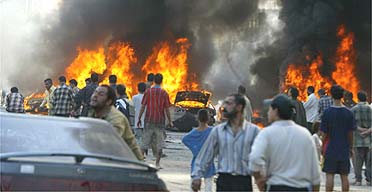 A fellow blogger posted a comment on one of the Mandarin's recent posts, with a link to his own blog, called the Upside Down Flag. Seeing the title reminded the Mandarin of his early run-in with military justice.
A fellow blogger posted a comment on one of the Mandarin's recent posts, with a link to his own blog, called the Upside Down Flag. Seeing the title reminded the Mandarin of his early run-in with military justice.
Regular reader(s) may recall that the Mandarin was an Army Officer during what, at the time, we called the Big Practical Exercise ("P.E."), a/k/a the Vietnam "conflict." Just as until recently there was no Civil War in Iraq, in those days there was officially no war of any kind in Vietnam. War not having been declared, it was called a "conflict."
Mandarin footnote: In Analects 13:3, Confucius made an observation that rings as true in Shrub's second term as it did when first written down (in these very words) twenty-five centuries ago. The key term zhèng míng 正名 is usually translated "rectification of names" or "rectification of terms." In practice it means what we call things should accurately describe their reality:
子路曰衛君待子而為政子將奚先子曰必也正名乎子路曰有是哉子之迂也奚其正子曰野哉由也君子於其所不知蓋闕如也名不正則言不順言不順則事不成
Zilu said: "If the ruler of Wei put the administration of his state in your hands, what would you do first?" Confucius said: "If something had to be first, I would say rectification of terms." Zilu said: "That's it? What a strange approach to things! Why start with rectification of terms?" Confucius said: "Yu, how unsophisticated you are. A gentleman should be careful when talking about things of which he is ignorant. When terms for things are not correct, then what is said will not make sense; when what is said does not make sense, then our undertakings must end in failure."
What is said will not make sense....
among thousands of examples, a few come quickly to mind: "No Child Left Behind," "Clear Skies," "Mission Accomplished," "last throes," "Freedom is untidy," etc.
...then our undertakings must end in failure.
Anyway, returning to the Mandarin's flirtation with the stockade, flash back to Fort Sill, Oklahoma, late 1970 or early 1971.
Way too clever for his own good -- what else is new? -- young Second Lieutenant Mandarin, Field Artillery, US Army Reserve, decides to put a small flag decal on the back panel his unobtrusive, brand new, bright screaming yellow Triumph TR-6 roadster. 
Upside down.
The next morning, Big Ugly Sergeant pokes his head into 2LT Mandarin's cubicle in the faculty area of the Field Artillery School Tactics Department, where the Mandarin was an instructor in "Stability Operations," a euphemism (rectification of terms, anyone?) for what our forces are trying to conduct in Iraq these days.
B.U.S.: "Lt. Mandarin, is that your little yellow foreign sports job in the Officer's parking lot?"
2LTM:" Yes, Sergeant."
BUS: "Then kindly report to the Colonel's office toot sweet."
A few minutes later, 2LTM is standing at attention in front of the Colonel commanding the Tactics Department. It should be noted that the Colonel was already not enamored of the Mandarin because of the Mandarin's habit of routinely skipping the Colonel's weekly mandatory officer-only Bible study and prayer breakfasts. (The Mandarin assumed heathen non-coms and enlisted ranks were on their own, prayer breakfast-wise.)
Col: "Lieutenant Mandarin, are you aware there is an upside-down flag decal on the back of your car?"
2LTM: "Yes, a picture of an upside-down flag, sir."
Col: "Why is it upside-down?"
2LTM: "As a distress signal, sir."
Col: "Are you in distress, Lieutenant Mandarin?"
2LTM: "No, sir."
Col: "Is this some kind of political protest, Lieutenant Mandarin?"
2LTM: "No, sir. It is an exercise of free speech, sir."
Col: (sneering) "Well, you young smart-ass, whatever you think it is, I think it is violation of the regulation governing display of the flag, and you will remove it or I will bring you up on charges."
2LTM: "Excuse me, sir, but the regulation on 'Flags and Pennants' does not apply here, sir. It states that flags must be made 'of silk or an acceptable substitute cloth material.' Therefore, my decal isn't a flag, sir, it is only a picture of a flag."
The conversation continued with bursts of surprisingly un-Christian expletives (the Colonel) punctuated by increasingly uncomfortable silences (2LTM), culminating in the Mandarin being offered two choices: 1) remove the decal in the next fifteen minutes, or 2) be demoted to private and shipped off to Vietnam as an infantry rifleman on the next plane out.
A few minutes later, as the Mandarin sat on the asphalt peeling the flag decal off the back of his car, while the Big Ugly Sergeant supervised, he planned phase two of his Waldenesque (Quixotic?) campaign of civil disobedience.
Later that afternoon, the Mandarin changed his glasses frames from G.I. plastic to a pair of thin wire-rims that resembled as closely as possible those in the standard news photos of Trotsky.
 The odds of the Mandarin being shipped off to the land of the Big P.E. for striking this new, much subtler blow for freedom, were minimized by the likelihood that neither the Big Ugly Sergeant nor the Bible-thumping Colonel were likely to know Leon Trotsky's wire-rimmed glasses from Nikolai Lenin's.
The odds of the Mandarin being shipped off to the land of the Big P.E. for striking this new, much subtler blow for freedom, were minimized by the likelihood that neither the Big Ugly Sergeant nor the Bible-thumping Colonel were likely to know Leon Trotsky's wire-rimmed glasses from Nikolai Lenin's.
Or John Lennon's for that matter.
 The Mandarin is continually amazed at the absolutely intractable density of our Decider-in-Chief. Especially his tantrum today:
The Mandarin is continually amazed at the absolutely intractable density of our Decider-in-Chief. Especially his tantrum today:




























